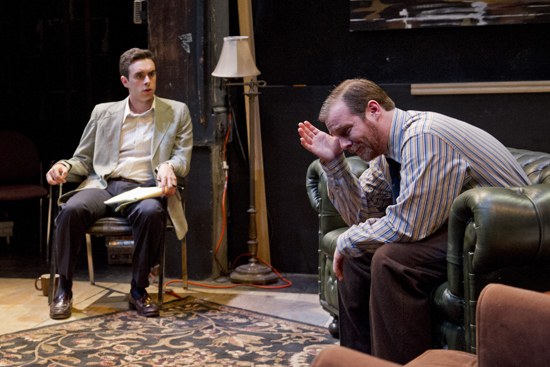Shining City: The Loneliness of Therapist, Patient
CFA stages Tony-nominated play at BU Theatre

Patrick Varner (CFA’13) (left) and Spencer Parli Tew (CFA’14) perform in the College of Fine Arts production of Shining City, running through Saturday at the BU Theatre. Photos by Kalman Zabarsky
Set in Dublin in 2004, before Ireland’s economic bust, Conor McPherson’s Shining City explores the nuanced, layered relationship shared by psychotherapist and patient. The Tony-nominated play probes the question of how much a therapist’s personal life colors his or her work, and whether those who choose the profession are driven by their own pathology, conscious or unconscious.
The College of Fine Arts School of Theatre is staging the Tony-nominated play this weekend at the BU Theatre’s Lane-Comley Studio 210, under the direction of master’s candidate Hondo Weiss-Richmond (CFA’13), in one of the productions closing the college’s 2012–2013 season.
Shining City, described by one critic as “a play full of echoes,” is a story about men and their demons, its characters mired in loneliness and guilt. The two main protagonists are therapist and former priest Ian, played by Patrick Varner (CFA’13), and his patient John, a salesman haunted by what he’s convinced is the ghost of his dead wife, played here by Spencer Parli Tew (CFA’14). The four-member cast is rounded out by Andrea Ramos (CFA’13) as Neasa, Ian’s lover, and Nikhil Sadhnani (CFA’15) as Laurence, a casual contact of Ian’s who is hard up for cash.
Although set in the real world, the 2006 play, like the morality tales of many Irish dramatists, from Samuel Beckett to John Millington Synge, has overtones suggesting otherworldly forces at play.

David Seeman, a Student Health Services Behavioral Medicine senior staff psychologist, will lead a talk-back discussion after Friday evening’s performance. “It’s a fascinating play in the sense of trying to make the therapist into a real human being,” Seeman says. While therapists don’t often appear as characters in stage plays, they abound in television and movies (think The Sopranos, Analyze This, What about Bob?), which tend to overdramatize or mock the proceedings, apparently in fear “that plain old therapy is too bland,” he says. He adds that psychotherapists in film and fiction often cross well-established professional boundaries (the reckless confidentiality breach by the psychiatrist in The Prince of Tides is one glaring example). But Shining City embraces the material with far more honesty, he says, and the therapy scenes in the McPherson play are most comparable to Gabriel Byrne’s real-time sequences in the HBO series In Treatment.
In the play, psychotherapist Ian doesn’t say a whole lot. “He’s pretty passive,” Seeman says, “and you’re not really sure whether he’s helpful or not, and even that’s realistic.” The play offers a stark glimpse into the rarely dramatized truth that “the relationship goes both ways,” he adds. “Something the public may not realize is that the therapist can be as affected by the client as the client is by the therapist.”
The Irish drama’s London debut was described by The Guardian as “compulsively gripping,” and the 2006 Broadway production starring Oliver Platt was praised by Ben Brantley of the New York Times as “quiet, haunting and absolutely glorious.” McPherson, whose earlier plays, such as The Weir, were monologues, uses uninterrupted, raw confessional voices to convey subjective realities in which things may be surprisingly different from what they seem.

“The language is very everyday,” notes Weiss-Richmond, who describes the character John’s monologues as having the ebbs, flows, and forward movement of symphonies. The play, he says, does “an amazing job of exploring the dichotomy between the personal life and professional life of the therapist,” something the director knows well, having grown up in a family of mental health professionals. He says he was drawn to McPherson’s compelling, “delicate piece” for its nuanced handling of life’s big questions.
The CFA cast members perfected their Dublin dialects with coaching by Christine Hamel (CFA’05), a CFA assistant professor of voice and speech. Dialect was essential for this play, according to Weiss-Richmond. “McPherson’s language wouldn’t work without it,” he says emphatically.
Shining City runs through Saturday at the Boston University Theatre, Lane-Comley Studio 210, 264 Huntington Ave., Boston. Performances are tonight, Thursday, May 2, at 7:30 p.m., Friday, May 3, at 8 p.m., followed by a talk-back, and Saturday, May 4, at 2 and 8 p.m. Tickets are $12 general admission, $10 for students, BU alumni, senior citizens, Huntington Theatre Company subscribers, WGBH members, and groups of 10 or more. Members of the BU community are eligible for one free ticket with a valid BU ID, at the door, subject to availability. Tickets and further information are available here or by calling the box office at 617-933-8600. To get to the BU Theatre, take the MBTA Green Line E trolley to Symphony or the Orange Line to Massachusetts Avenue.
Comments & Discussion
Boston University moderates comments to facilitate an informed, substantive, civil conversation. Abusive, profane, self-promotional, misleading, incoherent or off-topic comments will be rejected. Moderators are staffed during regular business hours (EST) and can only accept comments written in English. Statistics or facts must include a citation or a link to the citation.